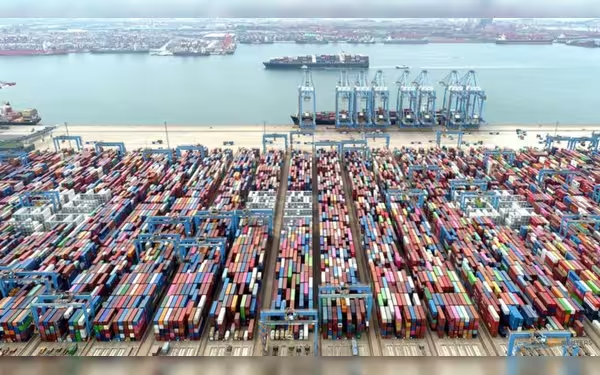Saturday, November 16, 2024 07:57 PM
China Shifts Trade Focus to Southeast Asia Amid Western Tariff Pressures
- China navigates trade disputes with Western nations.
- Southeast Asia emerges as a key market for China.
- Strategic pivot aims to mitigate tariff impacts.
 Image Credits: channelnewsasia
Image Credits: channelnewsasiaChina strategically shifts focus to Southeast Asia to counter Western tariff pressures amid ongoing trade disputes.
In recent years, global trade has become a battleground, with countries vying for economic dominance. China, a major player in international trade, is currently navigating through a series of trade disputes with various economies. These conflicts have raised eyebrows and sparked discussions about the potential consequences for the global market. As Western nations impose tariffs, China is strategically shifting its focus towards Southeast Asia, viewing it as a crucial market for future growth.
Trade wars can be likened to a game of chess, where each move can have significant repercussions. Analysts suggest that Beijing is engaging in trade wars with multiple countries, which raises concerns about how severe these conflicts might become. The question on everyone’s mind is: "How ugly will these conflicts be?" The stakes are high, and the outcome could reshape the landscape of global trade.
China's Qingdao port, bustling with containers and cargo vessels, serves as a reminder of the country's vast trading capabilities. As tensions rise with Western nations, China is not sitting idle. Instead, it is looking towards Southeast Asia, a region that offers immense potential for trade partnerships. By strengthening ties with Southeast Asian countries, China aims to mitigate the impact of Western tariffs and secure its position in the global market.
Moreover, Southeast Asia is not just a market; it is a gateway to other regions. Countries like Vietnam, Indonesia, and Malaysia are becoming increasingly important players in the global economy. By investing in these nations, China can diversify its trade relationships and reduce its reliance on Western markets. This strategic pivot could prove beneficial in the long run, allowing China to maintain its economic growth despite external pressures.
As China treads carefully through the complexities of global trade disputes, its focus on Southeast Asia highlights a significant shift in strategy. The potential fallout from these trade wars remains uncertain, but one thing is clear: the dynamics of international trade are evolving. For businesses and consumers alike, understanding these changes is crucial, as they will undoubtedly influence the global economy in the years to come. Keeping an eye on these developments will be essential for anyone looking to navigate the future of trade.













